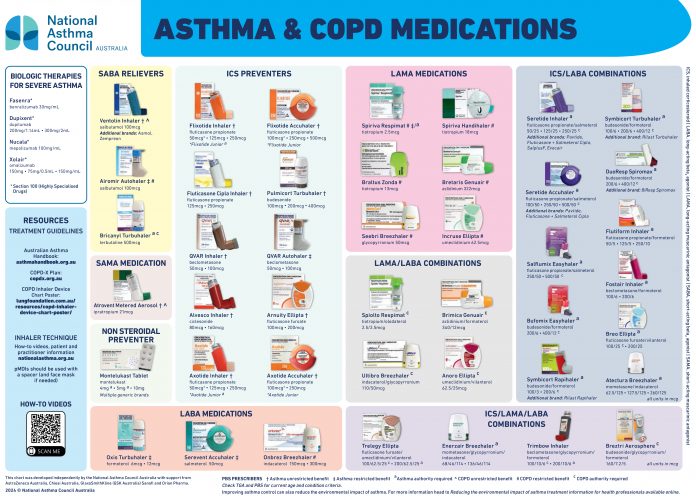The National Asthma Council Australia has released an updated version of its popular Asthma and COPD Medications chart.
Associate Professor Debbie Rigby, Clinical Executive Lead at the National Asthma Council Australia, said the updated 2024 chart has some important additions.
“The 2024 Asthma & COPD Medications chart includes a new dry powder inhaler called Easyhaler as well as a breakout box on biologic therapies for severe asthma. It also includes a reminder about the recent Reducing the environmental impact of asthma treatment paper that outlines how improving asthma control can also reduce the environmental impact of asthma.
“The chart is a handy reference that makes it easy to identify and explain different treatments and includes the latest inhalers available in Australia and specifies the PBS reimbursement status of each medication as of September 2024,” she said.
Associate Professor Rigby said there are so many inhalers now available that it can be confusing for patients and prescribers. The choice of inhaler device is often as important as the choice of drug(s).
“The wall chart can provide a visual prompt for patients to identify which inhaler they are using, as well as avoiding therapeutic duplication when prescribing.
“It is critical that the choice of inhaler is tailored to the individual and inhaler technique training is essential when a patient is commenced on a new inhaler or switched from one device to another.
“Inhalers should be selected in discussion with an individual patient, based on their preferences, satisfaction with the inhaler device, dexterity and cognition, peak inspiratory flow rate and preference for inhalers with a low carbon footprint,” she said.
The 2024 chart is also the first time that biologic therapies for severe asthma has been included.
“Biologic asthma therapies are highly effective as add-on treatment to inhaled corticosteroids to improve symptoms, reduce the rate of exacerbations and use of oral corticosteroids in people living with severe asthma and persistent type 2 inflammation.
“As biologic therapies need to be prescribed by a specialist, it is important that eligible patients with uncontrolled severe asthma are referred appropriately to a respiratory specialist,” she said.








